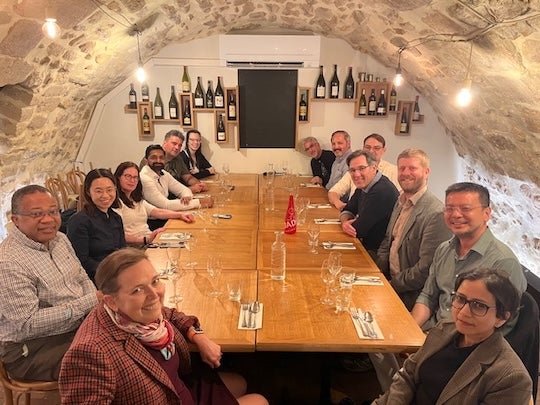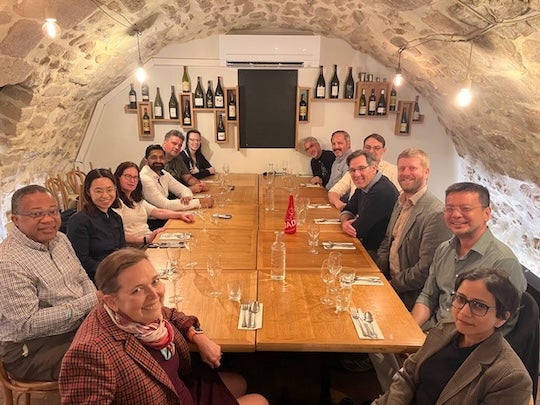The Boniuk Institute for the Study and Advancement of Religious Tolerance recently gathered scholars representing nearly a dozen different nations at the Rice University Global Paris Center to discuss new directions for global research on religious violence and pluralism.
“It was life-changing for me, and I do not say that lightly,” said Elaine Howard Ecklund, director of the Boniuk Institute and the Herbert S. Autrey Professor in Social Sciences at Rice. “We captured a vision for academic diplomacy, discussing some of the most significant issues facing our time, including how we can work together to do research that makes it attractive to states and communities to end religion-based violence, what healthy religious pluralism might look like and how academics might work more effectively with policymakers to address religious violence.”
Scholars from American University of Beirut, Florida International University, Fordham University, Freie Universität Berlin, Kyiv School of Economics, London School of Economics and Political Science, National University of Singapore, Pepperdine University, Princeton University, Santa Clara University, Catholic University of America and University of Oxford came together to approach religious violence not merely as a security concern but as a societal challenge. Scholar participants commented on the excellent locale and format of the convening that allowed for in-depth philosophical as well as data-driven conversations across “disciplinary silos” and the timely foregrounding of the “urgent need to recover the moral sources of pluralism.”

“The convening is exemplary of pluralism itself, where the depth of discussion took place in a safe space of respect with diverse topics, approaches, experiences and perspectives in intense exchange,” a scholar from the National University of Singapore said. “One key takeaway I had from the convening is that religious violence often erupts suddenly and with little notice from the hum of frictions and prejudices of everyday life, thus our work in understanding the issues, mitigating the tensions and creating channels of peace and inter-religious dialogue must also be persistent and never-ending.”
A scholar from Kyiv School of Economics echoed this sentiment. Although it is natural to avoid engaging topics like violence and discrimination, he said it is necessary “in order to know how to address it, how to prevent it and how to build sustained, resilient communities with lasting peace.”
The symposium offered opportunities to engage with global research on religious pluralism from a range of disciplinary perspectives — a priority integral to the Boniuk Institute’s strategic plan. The institute’s team works to convene leading experts across disciplines and sectors to discover new knowledge and disseminate research to promote meaningful change.
“It enriched my understanding of how various social forces contribute to the formation of religious pluralism as well as how political and structural factors can drive religious violence,” a scholar from Santa Clara University said. “Studying these dynamics is critical for fostering informed, constructive dialogue among diverse faith communities and promoting more inclusive societies.”
The Rice Global Paris Center serves as the institution’s hub in Europe and aims to facilitate collaboration with international partners.
“The center allows the university to further research while providing a unique space for students and scholars,” said Caroline Levander, Rice’s vice president for global. She works closely with university leaders and faculty to develop and expand international research centers such as the Rice Global India and the Paris Center. “It advances the university’s mission of contributing to the betterment of our world through dialogue and brings a global perspective to Rice’s commitment to pathbreaking research and unsurpassed teaching.”
Scholars commented on the long-term relationships forged at the convening and possibilities for new directions in research. A scholar affiliated with Centre d’Études de l’Inde et de l’Asie du Sud commented on the “historical background” of Paris that “allowed for a philosophizing that I hope to continue in conversation and research with my fellow scholars in the months ahead.” Another from Fordham University noted how the gathering “created space to explore how our diverse research might converge into a cohesive new program studying religious tolerance, pluralism and violence” and the long-term goal of “religion’s potential role in nurturing and sustaining vibrant societies.”
As Ecklund summed it up, “I am confident that the relationships forged over the three days we spent together will continue into the future and produce excellent collaboration in ways I had only dreamed about and can now see.”
To learn more about Boniuk Institute programming, visit here. To learn more about Paris Center programming, visit here.

